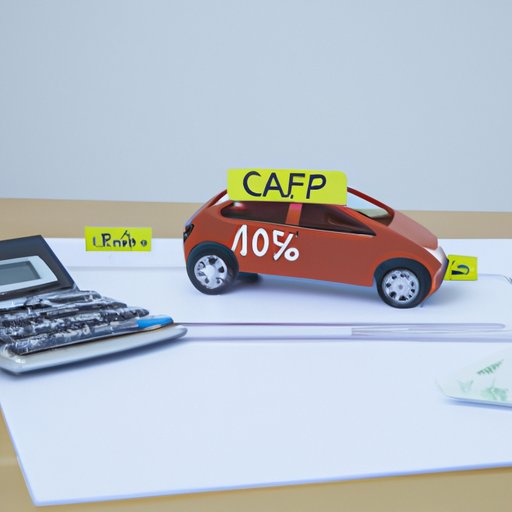Introduction
When you’re in the market for a new car, one of the most important things to consider is the interest rate on your car loan. The interest rate will determine how much you pay for the car over time, so it’s important to understand how it works and shop around for the best deal. This article will provide an overview of car loan interest rates and how they work, as well as some tips for negotiating a lower rate.
Explaining the Different Types of Car Loans: What Interest Rates Are Available?
There are several different types of car loan interest rates available. It’s important to understand the differences between them so you can get the best deal possible on your car loan.
Fixed-Rate Loans
A fixed-rate loan is a loan with an interest rate that remains the same throughout the duration of the loan. This means that your monthly payments will stay the same, which can make budgeting easier. Fixed-rate loans are typically the most popular type of car loan, as they offer predictability and stability.
Variable and Adjustable Rate Loans
Variable and adjustable rate loans are loans with interest rates that change periodically. These loans usually start off with a lower interest rate than fixed-rate loans, but the rate can increase or decrease depending on market conditions. This type of loan may be a good option if you plan to pay off the loan quickly, as you can take advantage of any dips in the interest rate.
Other Types of Interest Rates
In addition to fixed-rate and variable/adjustable rate loans, there are also other types of car loan interest rates available. These include promotional rates (such as 0% APR for a certain period of time), tiered rates (which vary depending on the amount borrowed), and graduated rates (which start low and increase over time).
How Does Car Loan Interest Work? A Look at Compound Interest
Compound interest is a type of interest that is calculated on the principal amount of the loan, plus any accumulated interest from previous periods. Compound interest can have a significant effect on the total cost of your loan, so it’s important to understand how it works.
Definition of Compound Interest
Compound interest is defined as interest that is calculated based on the principal amount of the loan, plus any accumulated interest from previous periods. This means that the interest rate is applied to the total amount of the loan, including any interest that has already been paid.
How to Calculate Compound Interest
To calculate compound interest, you must first determine the principal amount of the loan, the interest rate, and the number of times per year that the interest rate will be compounded. Once you have these numbers, you can use a compound interest calculator to determine the total amount of interest that will be paid over the life of the loan.
Understanding Your Car Loan Interest Rate
Your car loan interest rate is determined by several factors, including your credit score, loan term, and the type of loan you choose. It’s important to understand how these factors can affect your interest rate so you can get the best deal possible.
Factors That Impact Your Interest Rate
Your credit score is one of the most important factors that will determine your interest rate. The higher your credit score, the lower your interest rate will be. Other factors that can affect your interest rate include the loan term (the longer the term, the higher the interest rate), the type of loan (fixed-rate loans typically have lower interest rates than variable or adjustable rate loans), and the size of the loan (larger loans typically have higher interest rates).
How to Negotiate a Lower Interest Rate
If you don’t like the interest rate you’ve been offered, there are a few things you can do to try to negotiate a lower rate. First, shop around and compare different lenders to see who is offering the lowest interest rate. You can also try to improve your credit score before applying for a loan, as this can help you get a better rate. Finally, you can try to negotiate directly with the lender to see if they will offer you a lower rate.

Car Financing 101: Calculating Interest on Your Vehicle Purchase
Once you’ve decided on a loan and negotiated a rate, it’s important to understand how to calculate the interest on your vehicle purchase. Here’s a look at what you need to know.
Estimating Your Monthly Payment
The first step in calculating the interest on your vehicle purchase is to estimate your monthly payment. To do this, you’ll need to know the principal amount of the loan, the interest rate, and the loan term (the number of months you’ll be paying back the loan). Using this information, you can use an online calculator to estimate your monthly payment.
Factors to Consider when Calculating Interest
When calculating interest, it’s important to consider several factors. First, you should consider the type of loan you’re taking out. Fixed-rate loans typically have lower interest rates than variable or adjustable rate loans. You should also consider the size of the loan, as larger loans typically have higher interest rates. Finally, you should consider any additional fees or charges that may be associated with the loan, such as origination fees or prepayment penalties.
Conclusion
Shopping around for a car loan interest rate can be beneficial, as it allows you to find the best deal possible. It’s important to understand the different types of car loan interest rates available and how to calculate compound interest. Additionally, understanding the factors that can impact your interest rate and how to negotiate a lower rate can help you get the best deal on your car loan.
(Note: Is this article not meeting your expectations? Do you have knowledge or insights to share? Unlock new opportunities and expand your reach by joining our authors team. Click Registration to join us and share your expertise with our readers.)
